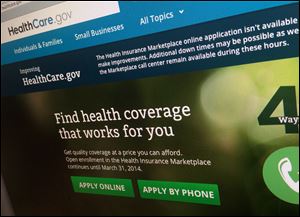
OHIO POLITICS
Medicaid filings put morals before court
Usual allies at odds in legal wrangling
12/16/2013
Dozens of health organizations, business groups, labor unions, hospitals, doctors, faith organizations, and others have weighed in with briefs, making direct appeals to the seven justices on the Ohio Supreme Court as to why Medicaid should be expanded — not just the legal argument it can be expanded.
COLUMBUS — For many who’ve inserted themselves into the court fight over Ohio’s expansion of Medicaid, the issue is more than just a legal question.
Dozens of health organizations, business groups, labor unions, hospitals, doctors, faith organizations, and others have weighed in with briefs, making direct appeals to the seven justices on the Ohio Supreme Court as to why Medicaid should be expanded — not just the legal argument it can be expanded.
The fight has set lawmaker against lawmaker and Republican governor against GOP conservatives. It also has has divided opponents of abortion rights.
At issue is the legal question of whether a little-noticed, seven-member, quasilegislative panel could expand the government health insurance of last resort without a vote of the full General Assembly.
The legal briefs make a moral case for providing Medicaid coverage to the poor, homeless, disabled, and even veterans who have fought for America.
“Under Medicaid expansion, 26,000 currently uninsured veterans and an additional 12,000 spouses and family members would qualify for Medicaid eligibility … ,” reads a brief filed by the Ohio National Guard Association. “Medicaid will thus provide material improvements in the health and quality of life of nearly 40,000 veterans and their families, all of whom have proudly served on behalf of their fellow Ohioans.”
The briefs also make the economic argument it makes no sense to reject billions in promised federal dollars that could create health-care jobs and that providing preventive care now will save government money in the future.
But how much will such arguments factor into the decision of a court whose majority members have said it is their job to interpret the letter of the law and gauge the intent of lawmakers, not to substitute their own judgment?
“Despite … sharp political overtones associated with expansion of Medicaid spending and eligibility in Ohio, this case is not about whether the controversial and highly contested expansion is wise public policy,” reads the brief filed by six conservative GOP lawmakers and two groups against abortion rights.
“Rather, the salient and critical legal issue before the Court is whether the Executive Branch of government may effectuate such a major policy change administratively — not only without a vote of the Ohio General Assembly, but over the objections of the General Assembly,” it adds.
The court is expected to decide before the end of the year whether Gov. John Kasich, a Republican, overstepped his authority when he turned to the Ohio Controlling Board to effectively expand Medicaid eligibility after the General Assembly refused to act.
The board voted 5-2 in late October to draw down nearly $2.6 billion in federal funds to pay for the expansion through June 30, 2015. Even sitting members on the panel who supported the expansion agreed it never had done anything so big before.
The expansion is expected to add a net 275,000 Ohioans, mostly working-poor adults without dependent children, to the rolls.
Eligibility has been expanded to those earning as much as 38 percent over the federal poverty level. That’s about $32,000 a year for a family of four.
The federal government has promised to pick up 100 percent of the cost for the first three years of the expansion. The reimbursement rate would gradually decrease to 90 percent after that time.
The state has maintained the decision was consistent with the board’s authority to drawn down federal funds that became available between legislative votes.
Reps. John Becker (R., Cincinnati), Ron Young (R., Leroy), Ron Hood (R., Ashville), Ron Maag (R., Lebanon), Matt Lynch (R., Solon), and Andy Thompson (R., Marietta) joined with Right to Life organizations in Cleveland and Cincinnati to challenge the maneuver as unconstitutional.
They maintain the Republican-controlled General Assembly made its intent clear when it stripped Governor Kasich’s expansion language from his two-year budget proposal earlier this year and inserted language prohibiting such an expansion before sending the final plan to his desk.
Mr. Kasich used his line-item veto authority to strike the prohibition language before signing the budget into law.
“Absent meaningful judicial oversight, there is nothing to prevent the Controlling Board — a small group of legislators and executive branch officials not representative of the General Assembly as a whole — from dramatically supplementing, amending, or altering public program and policy goals and levels in a manner inconsistent with the General Assembly’s intentions,” the lawsuit reads.
“This matter transcends partisan politics. ”
The Supreme Court set an expedited briefing schedule that has run its course. It did not set a deadline for a decision, but Jan. 1 is when the expansion is set to begin. The state already has begun accepting applications at www.benefits.ohio.gov.
A brief filed by the American Center Society on behalf of the Toledo/Lucas County CareNet, Ohio Federation of Teachers, the Toledo Area Jobs with Justice & Interfaith Worker Justice Coalition, and others argue that this is more than just an ideological argument.
“[Expansion opponents] have only an ideological interest, and indeed they recognize … that they have ‘no rights or obligations peculiar’ in this litigation … ,” the brief reads.
“[They] suggest they bring this action ‘to vindicate the public interest.’ The public interest calls for the Medicaid expansion to go into effect on January 1, 2014.”
Contact Jim Provance at: jprovance@theblade.com or 614-221-0496.